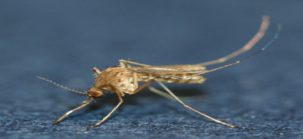The Korea Control and Prevention Agency (KDCA) said Friday that it issued a nationwide Japanese encephalitis alert as of Thursday, calling for people to follow precautions and get vaccinated.
Culex tritaeniorhynchus, the mosquito that transmits Japanese encephalitis, accounted for 63.2 percent (2,456 in 3,884) and 58.4 percent (1,684 in 2,878) of mosquitos in South Gyeongsang and South Jeolla provinces as a result of KDCA’s operation of the mosquito surveillance system on Wednesday.
According to the agency, Culex tritaeniorhynchus is a small, dark brown mosquito that lives in rice paddies, animal barns, and puddles and is mainly active at night. It occurs throughout Korea, and the density of Culex tritaeniorhynchus peaks in August and September and is observed to be active until the end of October.

Japanese encephalitis virus infection usually causes mild symptoms, including fever and headache. However, in rare cases, progression to encephalitis can cause severe symptoms, such as high fever, seizures, neck stiffness, confusion, convulsions, and paralysis, and 20 to 30 percent of patients may die. If the disease progresses to encephalitis, 30 to 50 percent of patients may suffer from neurological complications, depending on the site of injury, even if symptoms recover.
There are about 20 cases of Japanese encephalitis in Korea each year, with the first cases reported in August or September and most cases occurring until November. In the last five years (2019-2023), out of 91 reported cases of Japanese encephalitis, 87.9 percent (80) were 50 or older, with Gyeonggi Province, Seoul, and Gangwon Province having the largest number of cases.
Symptoms of Japanese encephalitis patients in Korea were in the order of fever, altered consciousness, encephalitis, and headache, and complications, such as cognitive impairment, motor impairment, paralysis, and speech impairment, were confirmed in 73.6 percent (67) of patients.
There is a vaccine for Japanese encephalitis, and it is recommended that people born after 2011, who are eligible for national immunization coverage, be vaccinated according to the standard immunization schedule, the KDCA said.
Adults 18 and older who have not been vaccinated against Japanese encephalitis and live in risk areas (near rice fields and pig barns) or plan to work in risk areas during the transmission season, foreigners who have moved from non-endemic regions and will live in Korea for a long period, and travelers from countries at risk for Japanese encephalitis, such as Bangladesh, Bhutan, India, Nepal, Pakistan, Sri Lanka, Brunei, Burma, Cambodia, Indonesia, Laos, Malaysia, the Philippines, Singapore, Thailand, East Timor, Vietnam, China, Japan, Taiwan, Russia, Australia, and Papua New Guinea, should also be vaccinated.
“During the summer months, people are more likely to be exposed to mosquitoes that carry Japanese encephalitis because of brisk outdoor activities, so please take extra care to avoid mosquito bites and vaccinate according to the vaccination schedule,” KDCA Commissioner Jee Young-mee said.
Related articles
- Korea reports triple surge in hospitalized Covid-19 patients amid pertussis, mycoplasma pneumonia outbreaks
- National immunization rate for children reaches 96% at age 1
- North Korea suffers drop in immunization rates across multiple vaccines: WHO
- Korea reports 1st Japanese encephalitis cases of 2024, urges vaccination and prevention measures

